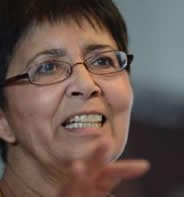Colloquium to Address Feminist Perspectives on Intersectionality, Transnationalism, and Decoloniality
Three Experts to Share Views at October 24 Event

Three experts will speak Friday, October 24, at the Syracuse Symposium™ colloquium “Negotiating Feminist Perspectives: Intersectionality, Transnationalism and Decoloniality.”
The free, public event is 12:45 to 5:15 p.m. in 304 A/B/C, Schine Student Center. There will be light refreshments to start, and CART transcription will be provided.
Intersectionality, transnationalism, and decoloniality are ways of knowing generated to contest subjugation and to resist systemic inequality. Yet, critical uptake of these perspectives in contemporary feminist scholarship can distort or depoliticize. This colloquium engages each perspective, on its own terms and relationally, to cultivate their radical, and radically different, possibilities.
The speakers and their presentations are:
Sirma Bilge, "The Neoliberal Domestication of Insurgent Knowledges: The Case of Intersectionality."
Bilge is Associate Professor of Sociology at l'Université de Montréal and Associate Editor of the Journal of Intercultural Studies. Her research examines sexual nationalism, intersectionality's whitening, racialized governmentality of immigration, coalition politics, and academia's incorporation of minority knowledges. Bilge founded and directed the Intersectionality Research Unit in Montréal (2005-2010). With co-author Patricia Hill Collins, she is working on a manuscript on intersectionality.
 Rita Kaur Dhamoon
Rita Kaur Dhamoon, "Feminist Anxieties and Transformative Possibilities: Transnationalism, Intersectionality, and Settler Colonialism."
Rita Kaur Dhamoon
Rita Kaur Dhamoon, "Feminist Anxieties and Transformative Possibilities: Transnationalism, Intersectionality, and Settler Colonialism."
Dhamoon is Assistant Professor in Political Science at the University of Victoria, the territory of the Lekwungen peoples, Canada. Her research interests include multiculturalism, nation-building, and race-making; gender and feminist politics; critical race and anti-colonial politics; and settler colonialism. Among other publications, she is author of Identity/Difference Politics (2009). Her work is grounded in anti-racist feminist action.
The free, public event is 12:45 to 5:15 p.m. in 304 A/B/C, Schine Student Center. There will be light refreshments to start, and CART transcription will be provided.
Intersectionality, transnationalism, and decoloniality are ways of knowing generated to contest subjugation and to resist systemic inequality. Yet, critical uptake of these perspectives in contemporary feminist scholarship can distort or depoliticize. This colloquium engages each perspective, on its own terms and relationally, to cultivate their radical, and radically different, possibilities.
The speakers and their presentations are:
Sirma Bilge, "The Neoliberal Domestication of Insurgent Knowledges: The Case of Intersectionality."
Bilge is Associate Professor of Sociology at l'Université de Montréal and Associate Editor of the Journal of Intercultural Studies. Her research examines sexual nationalism, intersectionality's whitening, racialized governmentality of immigration, coalition politics, and academia's incorporation of minority knowledges. Bilge founded and directed the Intersectionality Research Unit in Montréal (2005-2010). With co-author Patricia Hill Collins, she is working on a manuscript on intersectionality.
 Rita Kaur Dhamoon
Rita Kaur DhamoonDhamoon is Assistant Professor in Political Science at the University of Victoria, the territory of the Lekwungen peoples, Canada. Her research interests include multiculturalism, nation-building, and race-making; gender and feminist politics; critical race and anti-colonial politics; and settler colonialism. Among other publications, she is author of Identity/Difference Politics (2009). Her work is grounded in anti-racist feminist action.

María Lugones, "Thinking Gender Decolonially."
Lugones is renowned for her scholarship on decolonial feminist praxis and theorizing coalition against multiple oppression. She is a founding member of Escuela Popular Norteña, a collective for radical education and organizing, and Director of the Center for Interdisciplinary Studies in Philosophy, Interpretation, and Culture at Binghamton University. Lugones has authored numerous influential articles and Pilgrimages/Peregrinajes: Theorizing Resistance against Multiple Oppressions.
"Intersectional, transnational, and decolonial feminisms invite us to think more adequately about how to understand, contest, and dismantle multiple and interlocking systems of inequality,” says Vivian May, chair of the Women’s and Gender Studies Department and organizer of the event. “We are delighted to have three renowned scholars coming to SU to discuss some of the complexities of pursuing gender justice in ways that do not replicate or reinforce other forms of inequality and harm.”
The colloquium is co-sponsored by the College of Arts and Sciences and its Departments of African American Studies, English, Philosophy, Religion and Women’s and Gender Studies, the LGBT Studies and Writing Programs, and the Democratizing Knowledge Project; the Department of Cultural Foundations of Education in the School of Education; and the Department of Political Science and the South Asia Center at the Moynihan Institute of Global Affairs in the Maxwell School of Citizenship and Public Affairs.
“Perspective” is the theme of the 2014 Syracuse Symposium™, organized and presented by the Syracuse University Humanities Center in the College of Arts and Sciences. The semester-long series was launched in 2001 and draws thousands of people to free lectures, panel discussions, performances, and exhibitions, built on annual themes. Past symposia include “Listening,” “Identity,” “Conflict: Peace and War,” “Migration,” “Justice,” and “Light.” The symposium is organized and presented by the Humanities Center, which is administered by the College of Arts and Sciences.
Lugones is renowned for her scholarship on decolonial feminist praxis and theorizing coalition against multiple oppression. She is a founding member of Escuela Popular Norteña, a collective for radical education and organizing, and Director of the Center for Interdisciplinary Studies in Philosophy, Interpretation, and Culture at Binghamton University. Lugones has authored numerous influential articles and Pilgrimages/Peregrinajes: Theorizing Resistance against Multiple Oppressions.
"Intersectional, transnational, and decolonial feminisms invite us to think more adequately about how to understand, contest, and dismantle multiple and interlocking systems of inequality,” says Vivian May, chair of the Women’s and Gender Studies Department and organizer of the event. “We are delighted to have three renowned scholars coming to SU to discuss some of the complexities of pursuing gender justice in ways that do not replicate or reinforce other forms of inequality and harm.”
The colloquium is co-sponsored by the College of Arts and Sciences and its Departments of African American Studies, English, Philosophy, Religion and Women’s and Gender Studies, the LGBT Studies and Writing Programs, and the Democratizing Knowledge Project; the Department of Cultural Foundations of Education in the School of Education; and the Department of Political Science and the South Asia Center at the Moynihan Institute of Global Affairs in the Maxwell School of Citizenship and Public Affairs.
“Perspective” is the theme of the 2014 Syracuse Symposium™, organized and presented by the Syracuse University Humanities Center in the College of Arts and Sciences. The semester-long series was launched in 2001 and draws thousands of people to free lectures, panel discussions, performances, and exhibitions, built on annual themes. Past symposia include “Listening,” “Identity,” “Conflict: Peace and War,” “Migration,” “Justice,” and “Light.” The symposium is organized and presented by the Humanities Center, which is administered by the College of Arts and Sciences.
Media Contact
Rob Enslin
